Medical expert of the article
New publications
Preparations
Nasal sprays for nasal congestion
Last reviewed: 03.07.2025

All iLive content is medically reviewed or fact checked to ensure as much factual accuracy as possible.
We have strict sourcing guidelines and only link to reputable media sites, academic research institutions and, whenever possible, medically peer reviewed studies. Note that the numbers in parentheses ([1], [2], etc.) are clickable links to these studies.
If you feel that any of our content is inaccurate, out-of-date, or otherwise questionable, please select it and press Ctrl + Enter.
Nasal congestion occurs due to inflammation of the epithelium of the nasal mucosa of various etiologies and increased permeability of the blood vessels that are there. Usually, this is not a separate disease, but one of the symptoms of diseases such as allergies, colds, acute respiratory viral infections or flu. To improve their condition, many people use nasal congestion sprays.
Indications for use
The main indications for the use of drugs that help cope with nasal congestion (in the form of a spray) are the following diseases:
- Runny nose due to a cold or flu.
- Sinusitis (diseases of the nasal sinuses, including sinusitis).
- Vasomotor and allergic rhinitis.
When using such products, their main components act on adrenaline receptors located on the mucous membrane of the nasal cavity. This leads to narrowing of blood vessels, reduction of nasal congestion, and it becomes easier for the patient to breathe.
It is important to follow the recommended dosage of the drug, otherwise, after stopping taking it, swelling of the nasal mucosa may even increase.
Pharmacodynamics and pharmacokinetics
Let's consider the pharmacodynamics of nasal sprays using the popular drug "Rinonorm" as an example.
This drug is an alpha-adrenergic agonist that is used locally to treat nasal congestion. The main substance in the spray, xylometazoline, helps to narrow the arterioles and capillaries, which reduces swelling of the mucous membrane of the nasal passages. It also reduces the amount of mucus secreted.
Almost immediately after application, the patient feels relief. It lasts for six to eight hours, after which the spray must be injected again. During this time, patency in the nostrils, Eustachian tubes and sinus openings is restored. After this, the patient feels much better, the possibility of complications is reduced.
Let's consider the pharmacokinetics of nasal sprays using the popular drug "Rinonorm" as an example.
Xylometazoline is almost not absorbed into the body when used topically. Large amounts of this substance are not visible in blood plasma, so it is impossible to determine them analytically.
Nasal decongestant spray names
To cure a runny nose, sprays are usually used, which you can buy at a pharmacy without a doctor's prescription. If your eyes run wide from the various names of drugs, we recommend paying attention to the following features.
First of all, all nasal sprays can be divided into several separate categories (by composition and direction of action).
The most popular sprays today are vasoconstrictors, which usually contain a decongestant substance. This allows you to temporarily stop the symptoms of the disease, improve breathing and mucus removal. At the same time, sneezing also stops.
There are several medications that contain a decongestant:
- With xylomentazoline:
Rinonorm. Contains the active substance xylometazoline hydrochloride, which helps reduce hyperemia, swelling and the amount of mucus secreted.
Rinonorm 0.1% is used three times a day in each nostril (one press on the plunger). However, the drug should not be used more often than seven times a day (at least four hours should pass between doses). Before administering the drug, it is necessary to clear the nostrils.
Contraindications: pregnancy, breastfeeding, dry rhinitis, early age (up to 2 years), intolerance to xylometazoline, closed-angle glaucoma.
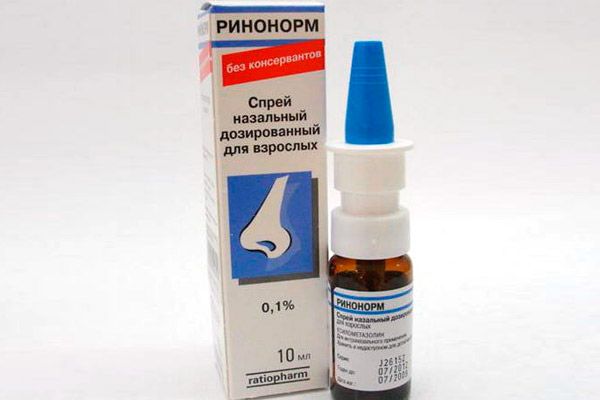
Side effects are rare, but you should still be wary of symptoms such as: headache, irritation of the mucous membrane, arrhythmia, nausea, skin rash.
Tizin Xylo Bio. Also based on the action of xylomethazine hydrochloride. It is used three times a day, one dose in each nasal passage. But the dosage may change depending on the severity of the patient's condition.
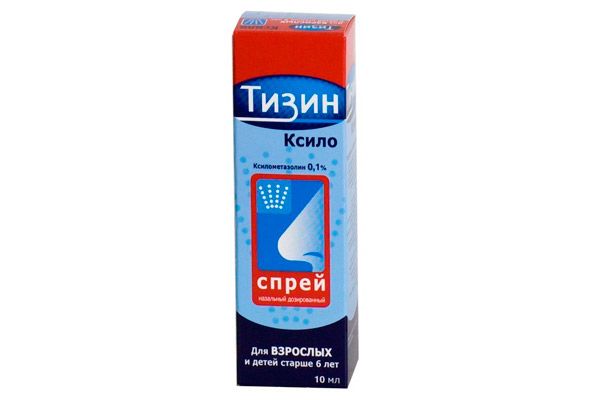
If the patient has chronic rhinitis, the drug is used only under strict supervision of a specialist. Clinical studies of the drug's effect on the fetus have not been conducted, so it is prohibited to use it during pregnancy.
Contraindications: thyrotoxicosis, some types of rhinitis, including atrophic, cardiovascular diseases, early age (up to 2 years), allergy to the components of the drug. Side effects from using the drug: burning that appears before sneezing, insomnia, headache, depression, tachycardia.
Ximelin. Can be used from the age of two (one or two times a day) one injection into each passage. Adults are prescribed the drug three times a day. The dosage can be increased. It is used for no longer than a week.
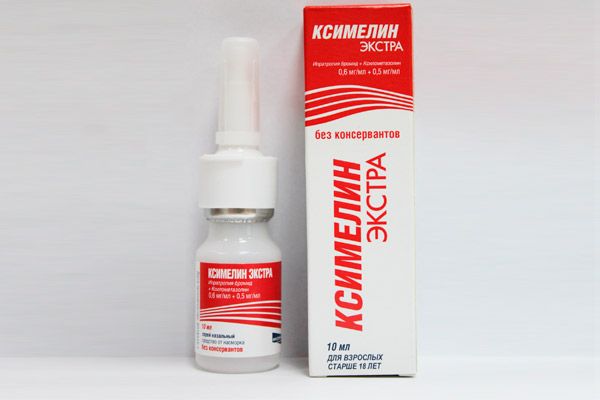
Contraindicated: during pregnancy, during lactation (sometimes it is still prescribed under the careful supervision of a specialist), for diseases such as: tachycardia, hyperthyroidism, glaucoma, arterial hypertension, atherosclerosis, atrophic rhinitis.
With frequent or prolonged use, side effects may occur: dryness in the nasal passages, sneezing, burning, vomiting, headache, migraine attacks, sleep disturbances and insomnia, depression.
- With oxymetazoline:
Nazol. Administer intranasally, two to three sprays into each nostril twice a day (adults and children aged twelve and over). The dosage for children aged six to twelve is slightly less: one spray twice a day. Duration of therapy is no more than three days. Overdose may cause greater breathing difficulties and swelling. If you notice any of these symptoms, you should stop treatment immediately.
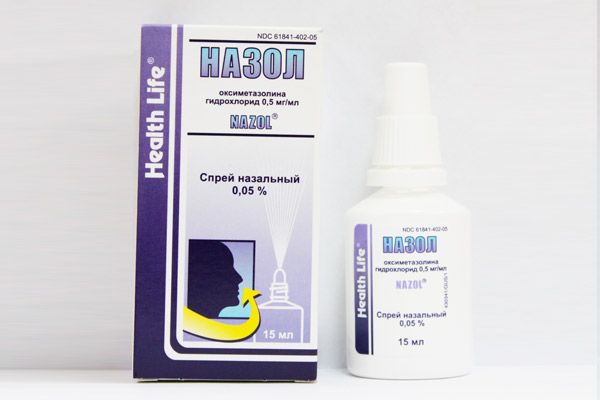
Contraindications: pregnancy, breastfeeding, children under seven, atrophic rhinitis, individual intolerance. Side effects sometimes include a burning sensation and dryness in the nasal cavity, reactive edema, headache and migraine attacks, nausea and vomiting, vertigo, sleep disturbances and insomnia.
Nazivin. The dosage of the drug is as follows: children from one to six years old can make one or two injections of the drug (0.025%) two to three times a day. Adults are prescribed one or two injections of the drug (0.05%) two to three times a day. A special feature of this drug is the fact that it can be used to treat infants.
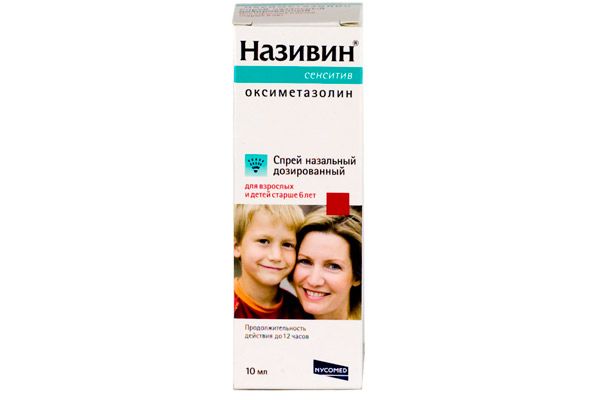
Contraindications: pregnancy and breastfeeding (can be used only in extremely rare cases), closed-angle glaucoma, some types of rhinitis, including atrophic, intolerance to oxymetazoline. Side effects: burning sensation of the nasal mucosa, which can cause sneezing, fatigue, unreasonable anxiety, nausea and vomiting, migraine attacks and headaches.
- With naphazoline:
Naphthyzinum. The dosage is completely individual, it depends on the complexity of the disease, as well as on the type. During pregnancy and breastfeeding, a spray for nasal congestion can be prescribed only in extreme cases and used only under the supervision of a specialist.
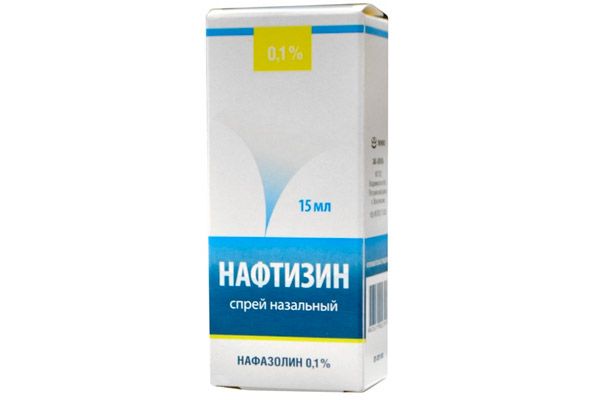
Contraindications: children under one year, hyperthyroidism, arterial hypertension, chronic atrophic rhinitis, atherosclerosis, diabetes mellitus, eye diseases. Side effects: irritation, swelling, occurrence of atrophic rhinitis, tachycardia, nausea and headaches.
- Homeopathic nasal sprays for congestion:
Euphorbium Compositum. A complex homeopathic preparation based on the action of mineral and plant substances. It has antiallergenic, reparative, anti-inflammatory effects. Thanks to the composition of the preparation, it is easy to stabilize metabolic processes in the nasal cavity.
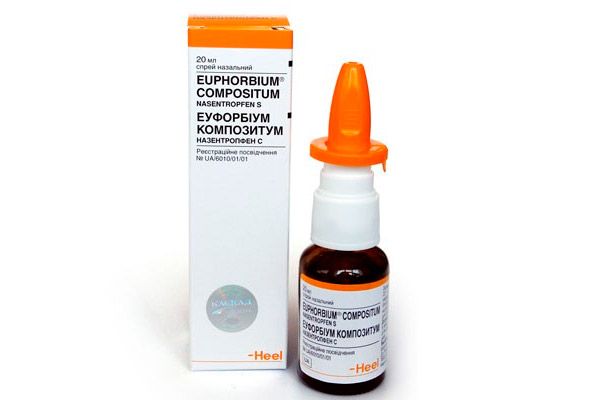
The product is injected directly into the nasal passages (one dose) three to five times a day. A special feature of the drug is that it can be used to treat children from one year of age. It cannot be used if there is an intolerance to the components. Side effects from the drug are rare. Sometimes the patient may feel itching or burning.
Nasal spray for children
To treat nasal congestion in young children, it is necessary to use safe preparations with sea salt.
Aqualor. This drug contains sea water with natural trace elements from the Atlantic Ocean. That is why Aqualor can be prescribed from the first day of life to treat nasal congestion. The dosage for newborns is as follows: two sprays into each nasal passage four times a day. Adults can use the drug up to eight times a day.
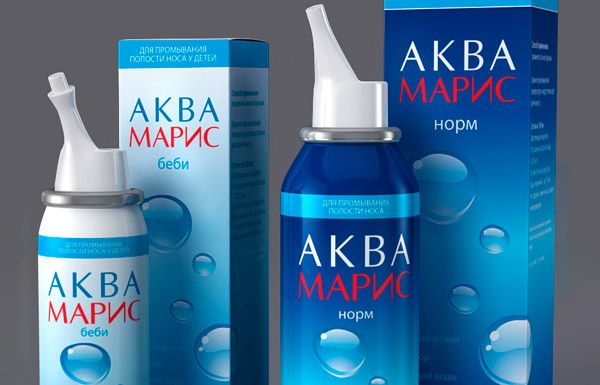
Contraindications: intolerance to the components. Side effects are almost non-existent, although sometimes dryness in the nostrils and burning may occur.
How to use nasal decongestant sprays
- Before using any nasal decongestant spray, you should thoroughly clear your nostrils.
- Pinch one nostril and only then begin to spray the product into the other.
- Take a shallow breath while injecting.
- Only children's sprays can be used to treat babies.
- If the disease is chronic or during pregnancy, vasoconstrictors and hormonal agents should be used with caution.
- Once the spray has entered your nose, try not to blow your nose or sneeze.
Using Nasal Sprays During Pregnancy
Almost all sprays prescribed for the treatment of a runny nose are contraindicated during pregnancy, as they have a vasoconstrictive effect. The decision on which drugs can be used to treat nasal congestion can only be made by a qualified specialist. The best option for a pregnant woman are sprays based on sea water (Aquamaris, Saline).
Many doctors recommend paying attention to homeopathic remedies, which are based on natural plant components. These include, for example, Euphorbium compositum.
Sprays based on oxymetazoline (Nazol, Nazivin) are considered completely contraindicated for pregnant women.
Contraindications for use and side effects
Even common and familiar sprays for each of us can have contraindications and unpleasant side effects. It is worth taking the health of your body seriously and carefully reading the instructions for sprays. Some components that are part of such drugs can cause allergies. Sprays can have the following contraindications:
- Cardiovascular diseases.
- Diabetes mellitus.
- Hyperplasia.
- Problems with the endocrine system.
- Arterial hypertension of varying severity.
- Prostate adenoma.
The most common side effects may include: dry nasal passages, allergies, irritation, heart rhythm disturbances, high blood pressure, headaches, insomnia, nausea.
Overdose and interactions with other drugs
Cases of overdose with nasal sprays for nasal congestion are quite rare. They occur mainly in childhood. Overdose may cause arrhythmia, increased blood pressure, which lead to loss of consciousness. To reduce the intensity of these symptoms, therapy is carried out under the supervision of a doctor.
The effect of drugs with xylometazoline may be enhanced by the simultaneous use of tetracyclic antidepressants. With MAO inhibitors, blood pressure may increase.
Storage conditions and shelf life
The nasal spray should be stored out of the reach of children at a low temperature (not higher than +25 degrees).
Once opened, the spray can be stored for no longer than one year. If the bottle is unopened, the shelf life is three years.
Effective sprays for runny nose and nasal congestion
Which spray for a runny nose and nasal congestion is the most effective is up to you. The fact is that the same drug can help in one case and not bring a positive result in another. Today, the most effective sprays are considered to be: Nazivin, Aquamaris, Nazol, Tizin, Rinonorm.
Attention!
To simplify the perception of information, this instruction for use of the drug "Nasal sprays for nasal congestion" translated and presented in a special form on the basis of the official instructions for medical use of the drug. Before use read the annotation that came directly to medicines.
Description provided for informational purposes and is not a guide to self-healing. The need for this drug, the purpose of the treatment regimen, methods and dose of the drug is determined solely by the attending physician. Self-medication is dangerous for your health.


 [
[